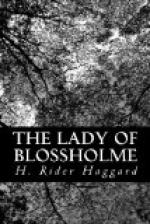“Is it the nakedness of your poor house”—and he glanced round the sumptuous chamber—“that caused you to send me this letter saying that you have Cromwell’s writ to seize my lands?” asked Sir John, rushing at his grievance like a bull, and casting down the document upon the table; “or do you also mean to make payment for them—when your summer rents come in?”
“Nay, son. In that matter duty led me. For twenty years we have disputed of those estates which, as you know, your grandsire took from us in a time of trouble, thus cutting the Abbey lands in twain, against the protest of him who was Abbot in those days. Therefore, at last I laid the matter before the Vicar-General, who, I hear, has been pleased to decide the suit in favour of this Abbey.”
“To decide a suit of which the defendant had no notice!” exclaimed Sir John. “My Lord Abbot, this is not justice; it is roguery that I will never bear. Did you decide aught else, pray you?”
“Since you ask it—something, my son. To save costs I laid before him the sundry points at issue between us, and in sum this is the judgment: Your title to all your Blossholme lands and those contiguous, totalling eight thousand acres, is not voided, yet it is held to be tainted and doubtful.”
“God’s blood! Why?” asked Sir John.
“My son, I will tell you,” replied the Abbot gently. “Because within a hundred years they belonged to this Abbey by gift of the Crown, and there is no record that the Crown consented to their alienation.”
“No record,” exclaimed Sir John, “when I have the indentured deed in my strong-box, signed by my great-grandfather and the Abbot Frank Ingham! No record, when my said forefather gave you other lands in place of them which you now hold? But go on, holy priest.”
“My son, I obey you. Your title, though pronounced so doubtful, is not utterly voided; yet it is held that you have all these lands as tenant of this Abbey, to which, should you die without issue, they will relapse. Or should you die with issue under age, such issue will be ward to the Abbot of Blossholme for the time being, and failing him, that is, if there were no Abbot and no Abbey, of the Crown.”
Sir John listened, then sank back into a chair, while his face went white as ashes.
“Show me that judgment,” he said slowly.
“It is not yet engrossed, my son. Within ten days or so I hope——But you seem faint. The warmth of this room after the cold outer air, perhaps. Drink a cup of our poor wine,” and at a motion of his hand one of the chaplains stepped to the sideboard, filled a goblet from the long-necked flask that stood there, and brought it to Sir John.
He took it as one that knows not what he does, then suddenly threw the silver cup and its contents into the fire, whence a chaplain recovered it with the wood-tongs.




